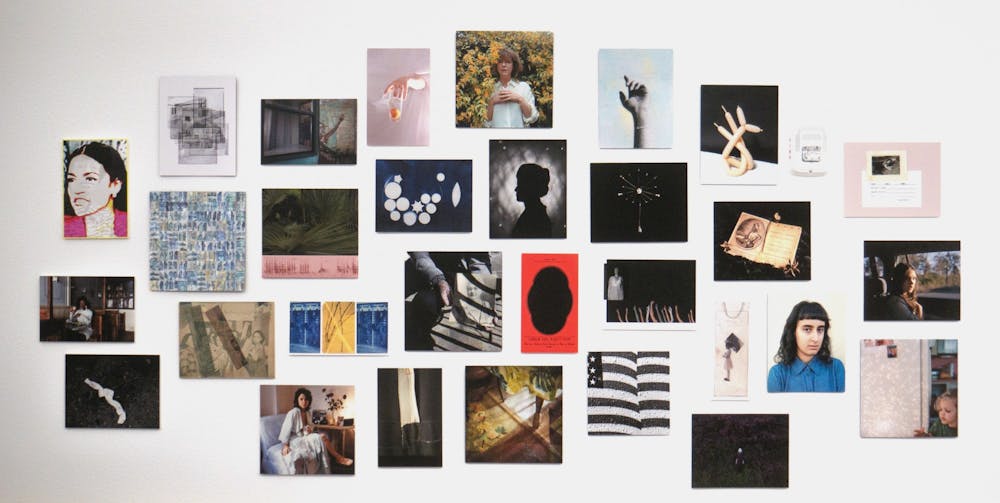The centennial anniversary of women’s suffrage is upon us in 2020, and “A Yellow Rose Project” celebrates the victories and acknowledges the losses of the historic passage of the 19th Amendment through an online photography exhibit.
University of New Mexico Honors College associate professor Megan Jacobs was one artist chosen among over a hundred other women to contribute to the project, collaborating with UNM students Hyunju Blemel, Sydney Nesbit, Sierra Venegas and Tilcara Webb. A portion of the exhibit is available to view in person at the Spectra Gallery at the Honors College.
Meg Griffiths, co-founder of the project, said it was created “in response to a project that women started 100 years ago, which was working on getting the right to vote but from a contemporary point of view.”
Artists provided various perspectives and views for “A Yellow Rose,” drawing from their own lives and experiences for inspiration, according to Griffiths.
“What you see is a huge sort of swath of perspective from very different women all across the United States, and at different ages and different stages in their careers,” Griffiths said.
The exhibit also displays how not all women had the right to vote. Depending on race, some measure of equality in the democratic experiment would take time to succeed, according to the website.
“Even though we technically got suffrage, it still took decades for women of color and all different minorities to actually get the right to vote just because of Jim Crow laws and all these other methods that the government tried to use in order to prevent women from voting,” Nesbit said. “So I think that I guess it would take another 40 or 50 years for us to really be able to celebrate and say that every single woman had the right to vote at this point.”
Jacobs acknowledged works of specific artists that stood out in this perspective, such as Cindy Hwang’s “Forgotten Suffragette” series, which highlights activist women of color that are commonly underrepresented in the face of more popular white activists, according to the artist’s statement.
“That’s bringing up, again, another sort of historical example that even when women had the right to vote, there were still exclusions that were happening for women of color,” Jacobs said.
Blemel and Nesbit said that learning more in-depth about the history of suffrage has allowed them to expand on their view of female history and what it means today.
“I think a big part of history is acknowledging what happened in order to prevent it from happening again,” Blemel said.
Griffiths said one of the ultimate goals of the exhibit was to encourage and stimluate political activism.
Get content from The Daily Lobo delivered to your inbox
Megan Jacobs highlighted the commonalities between the fight for the right to vote and the current political scene, speaking specifically to the long voting lines in the Georgia primary in June.
“I also think it’s important to say, ‘What things are repeating themselves?’ I felt this kind of uncanny sense of, ‘Oh my gosh, what’s happening right now with our upcoming election and with people having to wait in line for five hours to cast a vote,’ that’s really scary,” Jacobs said. “And I think that we need to be sort of looking to the past to say we don’t want to go back to those times — we want to make sure that we are preserving everyone’s right to cast a vote in democracy.”
Jacobs said strides still need to be made for women’s rights, especially reproductive rights.
"The exhibit was always meant to be online, so the coronavirus pandemic didn’t interrupt it in that sense," co-founder of the exhibit Frances Jakubek said. However, deadlines were changed, and in-person displays were adapted once the pandemic hit.
“Working with all women, a lot of responsibilities change for a lot of people, so all of a sudden if you have children they’re home with you, and (that impacts) your personal art practice,” Jakubek said. “I think a lot of people had to adjust.”
Griffiths said the project opened her eyes to a more selfless, collectivist mentality of working together towards a larger goal.
“It really showed me in a very deep way of which women can not be supportive of each other when they’re all fighting for the same cause essentially, and that kind of individualism mentality and I think this project, for me, was the culmination of the opposite of that,” Griffiths said. “It’s all about collaboration. It’s all about celebration and/or acknowledgment and/or the understanding that we have to do better and educate each other and educate ourselves.”
Jacobs noted how important it is to have a national dialogue about voting and continue raising awareness of civic responsibility.
“The women who did these things for us, who were beat up and thrown in jail and would go back to jail again ... They literally are our angels,” Griffiths said.
The Honors College Research Institute provided funding for the collaboration between Jacobs and the students.
“(This project) made me want to make those women before me proud of what they did, and that it didn’t go to waste,” Blemel said.
Griffiths and Jakubek will lead a Zoom presentation about the project with the Honors College on Sept. 28 at 4 p.m.
Megan Gleason is the culture editor at the Daily Lobo. She can be contacted at culture@dailylobo.com or on Twitter @fabflutist2716






